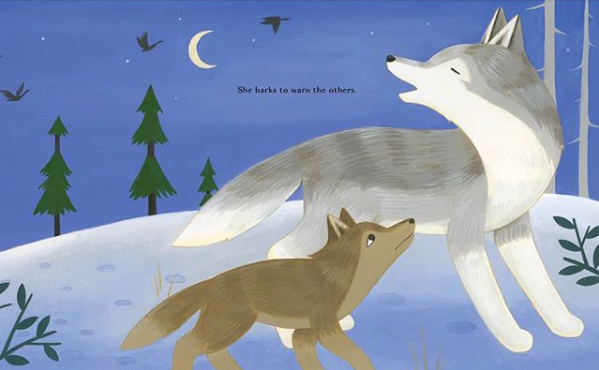 Spur reveals how wolves and humans are similar in some ways. Why did you choose to highlight this?
Spur reveals how wolves and humans are similar in some ways. Why did you choose to highlight this?
I wanted to help the reader empathize with the wolves and their current situation. Often wolves are villainized in literature and fairy tales—such as the ‘Big Bad Wolf’ in Little Red Riding Hood, or the hungry wolf in the Three Little Pigs. In reality, wolves are vulnerable creatures, like other animals in the ecosystem, such as caribou. The fact is, we humans are sharing, and trying to dominate, the same habitat as these other creatures. It’s worth reminding ourselves that we’re animals too.
What is a wolf cull, and why did you write about it?
A cull is a government-planned program of population control, which involves killing wolves to try and regulate their numbers. The government’s intention is to limit the wolf population to reduce threats to animals that wolves hunt as prey, such as livestock, or in the wild, caribou. I didn’t actually know much about wolf culls before I was approached to write this book, but when I began researching, I learned that wild animal populations are vulnerable due to other government programs, such as road-building or resource extraction. Just like in old fairy tales, wolves provide the convenient “villain,” but researchers have found that wolf culls don’t actually help to increase vulnerable caribou populations at all.

Was there a particular way you approached this topic, given you are writing for children?
The image of government-hired shooters targeting wolves from helicopters is terrifying for any age—never mind children ages six to eight! It certainly was a challenge to try and make this story palatable to young readers. To do so, I focused on relationship dynamics kids could resonate with, such as the love between siblings or parents and children. Spur feels a sense of home and belonging with her first pack—and especially her brother—that she spends the rest of the book trying to restore.
These are themes we start to engage with at a young age, from when we first learn to share or play with our siblings or peers on the playground.
In Spur, we see that logging has destroyed part of her habitat, making it difficult to find food and shelter. These are powerful scenes—what do you hope young readers will take away from them?
Yes—this is one of the most important themes of the book. In my research, I learned that certain indigenous communities support wolf culls to protect caribou, which are important to their cultures and traditions. I wanted to avoid a simplistic “killing is always bad” response, because the matter is more complicated than that. However, as I explain in my author’s note: humans, wolves, and caribou co-existed for thousands of years before settler governments got involved. The fact is, wolf and caribou populations alike are ailing because of government programs to colonize land and natural resources. Killing a few more wolves than caribou isn’t going to help if we’re still prioritizing material gain over our ecosystems.
Your previous books, including your latest novel Demi-Gods,are written for adults. What was it like to write your first book for children?
Definitely a challenge! Especially as the subject matter is so sensitive, and I wanted to make the themes accessible to young readers. However, I have a lot of respect for children—especially their imagination and compassion for others—so I resisted the idea of too heavily sugar-coating or “dumbing things down.” As an adult fiction writer, my way into writing is from a preoccupation with language. I had a lot of fun finding unique ways to describe items from a wolf perspective in this book, which I thought kids might appreciate. As adults, we forget the newness of things—helicopters are helicopters, cars are cars, etc. I didn’t think wolves would see it that way, so instead the helicopter is described as a “thunderfly” and cars are “great fur-less bears with smelly air snaking from their behinds.” Kids are still very much learning the names of things, and I thought they might be better than adults at not taking our shortcuts for granted.


